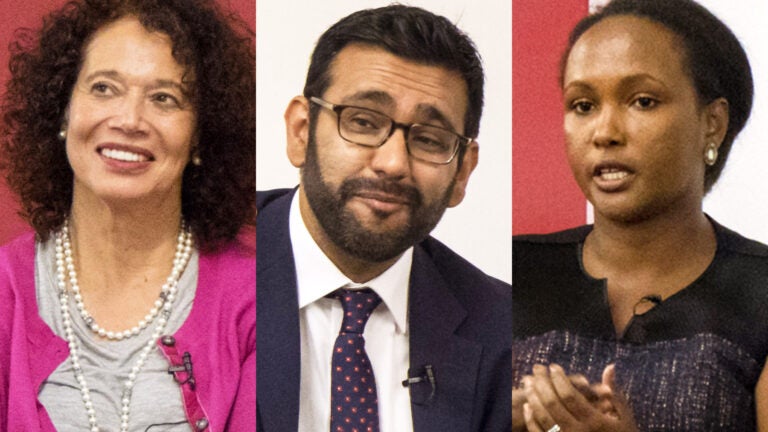
Firsthand stories about the refugee experience — from vetting to resettlement
Personal anecdotes reveal the backstories of people who sought a fresh start in a new country
What’s it like for refugees who arrive in the United States in search of a new home? Two of these people told their stories at a discussion hosted by the USC Price School of Public Policy’s Bedrosian Center on Governance and the Safe Communities Institute.
Meymuna Hussein-Cattan is executive director of Tiyya, an organization that serves refugees. Her parents fled Ethiopia, met, got married and gave birth to their daughter at a refugee camp in Somalia. They spent eight years at the camp, which seems like a long duration, but they were actually fortunate; the average wait time in a refugee camp is 17 years. She and her mother later co-founded Tiyya in Orange County to help people in a similar situation that they had faced.
Ehsan Zaffar is a senior adviser for the Department of Homeland Security’s Office for Civil Rights and Civil Liberties. Zaffar and his family fled Kuwait during the Gulf War in the early 1990s.
His last name was also Hussein, but his father changed it once they came to the U.S. after his family was discriminated against on the basis of his last name alone. Relatives and friends with loved ones in the U.S. military, who fought against Saddam Hussein, held the surname against Zaffar and his family — even though they had zero affinity for Saddam (indeed, Zaffar noted that Saddam was the reason his family lost their home in Kuwait).
However, Zaffar also saw the good side of people when the family was interviewed for a local television news report highlighting Gulf War refugees in the community.
“People started helping us out and we had nothing,” Zaffar said. “A lot of people were very welcoming to our family. I think that highlights something that is unique about the U.S. There is a lot of bigotry and rhetoric that might be anti-immigrant and anti-refugee, but on the flip side there is a lot of work done by people in terms of welcoming individuals who come to the U.S.”
The vetting process
Professor Raphael Bostic, who moderated the discussion, asked how likely is it for someone to go through all of the refugee screenings and end up participating in terrorism.
“There’s always a chance something could happen, but the vetting process is extremely thorough,” Zaffar said. “For Syrian refugees, it’s even more thorough. A person applying for U.S. refugee status undergoes a level of screening that no other traveler of any kind coming into the United States goes through.”
Cherrie Short, associate dean for global and community initiatives at the USC Suzanne Dworak-Peck School of Social Work, asserted that sometimes the terms “refugee” and “immigrant” can become mistakenly conflated. Some might think refugees are here to make their lives better economically, not that they’re fleeing persecution.
“The way governments can change people’s perception is by stating what refugees actually bring to the community,” Short said. “Once they’re resettled, people pay their taxes, they open businesses, their children become doctors, lawyers or professionals. Refugees bring with them a lot of good qualities and enrich communities culturally.”
Short added that each day an average of 34,000 people in the world become refugees. For students who want to make an impact in the area, Zaffar recommended spreading what they had learned at the event, Hussein-Cattan suggested working on affordable housing and Short advocated collective action.
“What I liked about this event is that there were facts and figures involved that I had never heard before,” said Victoria Rocha, a second-year Master of Public Administration student. “It was really impressive to have someone high up from Homeland Security here who has such a good personal story to really tie all this together. I thought the speakers did a really nice job talking about all the humanitarian needs that come from refugees and how they dovetail into a country’s own self interests.”
